It’s no secret that I adored Doomwar, while it was lambasted by the mainstream press and I must tell you guys Jonathan Maberry is easily my favorite celebrity personality of 2010. The interview flowed like gravy, I could talk to him until next year and it would never get old 🙂 When we’re done you’ll finally understand where Wakanda stands in the new marvel Universe, why Doomwar was a must read event and how Shuri and T’challa are very different Black Panthers!
BLACK HEROES: Tell our readers a bit about yourself.
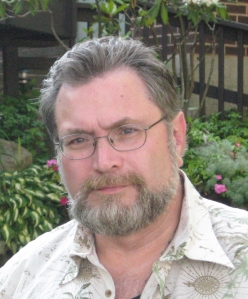 JONATHAN MABERRY: I’m a full-time writer and that’s the best job in the world. Since 1978 I’ve sold over twelve hundred magazine articles, tons of reviews, two plays, greeting cards, song lyrics, many nonfiction books, short stories and novels.
JONATHAN MABERRY: I’m a full-time writer and that’s the best job in the world. Since 1978 I’ve sold over twelve hundred magazine articles, tons of reviews, two plays, greeting cards, song lyrics, many nonfiction books, short stories and novels.
For most of my career I concentrated on nonfiction articles and books. A lot of my early stuff dealt with martial arts and self-defense. I’ve been a practitioner of jujutsu for 46 years, and I worked as a bodyguard in the entertainment industry, a bouncer, and then a college teacher (teaching Women’s Self-defense, Jujutsu, Martial Arts History, etc.). But after a while I began focusing on my other love—folklore. Writing about the folklore of vampires, werewolves and other monsters led me into writing fiction.
My first novels were the Pine Deep Trilogy (Ghost Road Blues, Dead Man’s Song and Bad Moon Rising), and I won a Bram Stoker Award for Best First Novel. That was pretty strong validation, so since then I’ve been concentrating mostly on fiction. Last year I novelized the remake of The Wolfman, which was my first New York Times bestseller. I write the Joe Ledger series of action thrillers. Patient Zero and The Dragon Factory are already out and have been optioned for TV by Sony Entertainment; and there are at least three more in the series due out, starting with The King of Plagues, due out in March. I’m also writing the Benny Imura series of post-apocalyptic zombie thrillers, which just launched with Rot & Ruin.
A couple of years ago I was scouted by Marvel Comics (after editor Axel Alonso read Patient Zero), and I’ve been splitting my writing time between novels, short stories and comics.
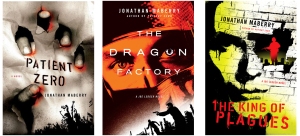
I teach experimental writing for teens, and I run a free Writers Coffeehouse that brings writers of all kinds together.
BH: How did you land the job as writer for Black Panther vol. 4 when Reggie Hudlin left?
MABERRY: Reggie was starting to get insanely busy while he was writing the book –remember, he’s a film producer and director—so I was asked to help with some edits and revisions for the last few issues of his run. That was a lot of fun, because banging ideas back and forth with Reggie was like getting paid to play. He’s a terrific guy.
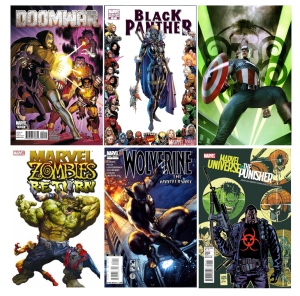
Reggie had also never intended to be a regular writer. He had wanted to do some limiteds and then move on.
I’d just written a couple of projects for Marvel –PUNISHER: NAKED KILL and a Wolverine short called ‘GHOSTS’ that appeared in WOLVERINE: THE ANNIVERSARY. The editor liked my style, and he liked the revisions I was doing on Reggie’s last issues…so he offered me the book. I jumped at it.
BH: How would you describe your experience writing the Black Panther?
MABERRY: It was very rewarding and very frustrating. The frustration came from the fact that Black Panther is a frequently canceled title. It has a very loyal, very dedicated core readership, but that readership isn’t large enough to keep the book afloat in this economy. That’s a drag, considering how important the character is.
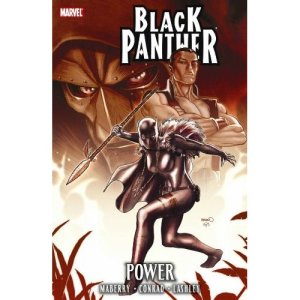
However my overall experience was a very rewarding one. I’ve always loved the character, and I actually owe a large personal debt to T’Challa. You see, I was born and raised in a very low income white neighborhood in Philadelphia called Kensington. This was in the sixties, and a lot of people in my neighborhood were strongly racist. We’re talking local chapters of the KKK. Unfortunately my father was part of that racist movement, so as a kid I was being fed a lot of propaganda about blacks, Jews and anyone who wasn’t white (by their standards of what ‘white’ meant).
Then I started reading the Fantastic Four, and I encountered T’Challa. Wow. This was in 1968. Here’s a black character who is smart, powerful, honorable, and respected. He’s a friend of the FF, and he becomes an Avenger.
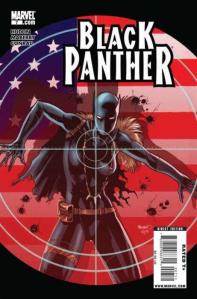
Then in 1971 I hit a real ‘moment’. An issue of FF came out in which T’Challa is arrested in a fictional country based on South Africa. This was my first encounter with the concept of apartheid. That story was so powerful that I started going to the library to look into the whole ‘race’ thing.
At the same time I was taking martial arts lessons on the sly. My father would never have approved, especially since the only school I could afford to join was predominantly black.
I approached my sensei, a retired black Army captain, and showed him the issue of FF. I asked him about apartheid, and he really set me straight. So…in a very real way, I learn my core values from T’Challa.
BH: Shuri is your Black Panther, how does she differ from T’Challa?
MABERRY: She’s completely different from T’Challa. She’s much younger; she’s not a scientist; and she has very little practical experience in statecraft or superheroics. What she has is nerve, a huge ego wrapped around massive insecurities, and rage issues.
However, like T’Challa, she has a deep core of genuine honor and integrity –which is something the Panther God, Bast, recognizes. Reggie wrote the story in which Shuri becomes the Panther. That happened in DEADLIEST OF THE SPECIES. I took over at the point where T’Challa has been forced to retire because of injuries sustained in an ambush by Doctor Doom and Shuri is now the Panther.
My run, POWER, is actually as much the story of T’Challa’s recovery as it is of Shuri’s exploration of her role as the Panther.
BH: Tell us about DoomWar and how it changes Wakanda and the rest of the marvel Universe?
MABERRY: For ten thousand years Wakanda has been a small but powerful independent nation. The source of their power is vibranium, an ore from a meteor that landed in Africa.
The question for me has always been…would the Wakandan people emerged as a powerful and honorable warrior race of they did not have vibranium. I rather like the idea that they would. That’s the seed I planted in POWER and which blossoms in DOOMWAR.
By the end of that series, Wakanda is no longer a resource-based economy. They don’t have their secret weapon.
Or do they?
The end of that series suggests that the true power of Wakanda is their depth of honor and unshakable quality of their integrity.
Stepping away from their dependence on vibranium is a dangerous choice, but I believe it is a good choice, because it means that Wakanda and its people are truly the heroes that we’ve always believed them to be. Yes, it makes them more vulnerable, but a true warrior does not fear attack.
BH: In DoomWar T’Challa met with a Feline God…..was this Bast? or something else?
MABERRY: Yes, that was Bast. Doom got to meet her and to plead his case for why he should be allowed to take the vibranium. Some clever readers have asked if Bast foresaw the rebirth of Wakandan honor and power as a direct result of having to ‘lose’ to Doom.
BH: How much does the technology pioneered by T’Challa during DoomWar play into the new Wakanda?
MABERRY: That’s something I did a lot of prep for, but which I haven’t yet had a chance to explore. David Liss may delve into some of that with Black Panther: Man Without Fear. For my part, I give a few hints that Wakanda did not have all of its technological eggs in one basket.
BH: DoomWar was a bold step into unknown territory, how much of Doom war’s ending was you or editorially mandated?
MABERRY: It was my ending. Marvel gave me a lot of creative freedom with that book, and we all knew that it was going to make some people cheer, some people curse me, and some people perk up and take a new look at the characters.
It was always the plan, from the earliest days of writing POWER that DOOMWAR would end the way it did. That was the point of the story, and it’s T’Challa’s speech near the end that defines the character. This is a man to whom honor is the most powerful weapon; and a man who loves his country so much that he is willing to risk its safety in order to save it.

BH: Where do you see Wakanda in the post DoomWar Marvel universe?
MABERRY: Again, that’s hard to say. DoomWar was a very successful series, so we drew in a lot of readers who would not normally look at a Panther book. Klaws was also very mainstream; and BP/Man Without Fear will tap into the Daredevil crowd. In an ideal world that would result in a new run of Black Panther. We’ll see.
But at very least, the characters in the Panther’s world are being taken very seriously. Which they deserve.
BH: You have a great handle on Dr. Doom, your characterization harkened back to past great Doom stories….why was he chosen as the Villain for your run on Black Panther?
MABERRY: Reggie started writing Doom into his run, but he wasn’t going to be the next villain on the mat, so to speak. I lobbied to use Doom and I built a good case for how he’s the only guy clever enough to figure out how to take down Wakanda.
I love the old-school Doom, the way Lee and Kirby did him. I wrote him to be cold, calculating and subtle. Not a ranting madman, but a genuinely brilliant scientist and tactician. Someone who would be a good match for another brilliant scientist and tactician: T’Challa. T’Challa is so smart and savvy that it’s tough to come up with a villain who could honestly give him a run for his money. Doom is a natural choice.
 BH: Tell us about Klaws of the Panther staring Shuri.
BH: Tell us about Klaws of the Panther staring Shuri.
MABERRY: Klaws is all about Shuri’s path to self-discovery. She was a peripheral character before, without much in the way of a personality. I wanted to give her dimension, but at the same time I wanted to screw her up so that I could explore her process of personal redemption. This is something writers love doing: deconstructing a character so that we can get into their heads through the cracks we’ve created.
In BLACK PANTHER: POWER and DOOMWAR we see that Shuri is smart, capable but very headstrong. Her rage issues and ego get her into trouble time and again, and in DoomWar she’s become convinced that the only safe way to win a fight is to kill her enemies. From the outside that appears to be a strength (and we can thank our first-person shooter videogame culture for that perception –and I’m just as guilty of it as the next guy); but in truth it’s a weakness.
In KLAWS, Shuri is trying to save the world, but at the same time she’s trying to save her own soul. She seeks advice from some sources that might appear to be unlikely (such as Wolverine), but once you’re inside the story you can see why she makes those choices. And why they’re the right choices.
The guest stars in the series aren’t simply stunt casting. Ka-Zar and Shanna are there because the Savage Land is now the primary source for vibranium (albeit a different kind). Wolverine is there because Shuri really needs to learn how to control her rage, and Logan has been wrestling with rage issues for over a century. In book #3 she tries to hire the Avengers, but only Spider-Man is on deck. Their interplay helps Shuri take another step, because –let’s face it—Spidey may be young but he’s logged more field time than just about anyone in the Marvel U. And in the final issue, the Black Widow is brought in to help crack a Cold War-era Russian security system. The Widow also provides some key woman-to-woman advice.
BH: Are there any plans to write another comic book series after Klaws of the Panther wraps up?
MABERRY: Not at the moment. I’m doing a bunch of other projects, including a five-issue Captain America mini-series, HAIL HYDRA and a prequel to MARVEL UNIVERSE VS THE PUNISHER.

The Black Panther appears in a couple of issues of HAIL HYDRA, by the way. Issue #3 is set at the point in Cap’s career where the Panther designs the flying suit for the Falcon. So I got a chance to include both of those characters.
BH: What would you say are the highlights of your run writing Black Panther?
MABERRY: I wanted to explore the nature of honor, and I think I accomplished that. And I got the chance to define Shuri’s personality…and to even let her have some fun. KLAWS is a fun series, with as much humor as drama.
Also, writing Panther gave me an opportunity to write scenes with some of my favorite characters: the Fantastic Four, WarMachine, Namor, Doom, the X-Men and Deadpool. Each of them played a crucial role in the story, and for the most part it was my first time writing those characters. I may be a rough, tough martial arts guy and a bestselling writer and that all that…but at heart I’ll always been a comic book geek.
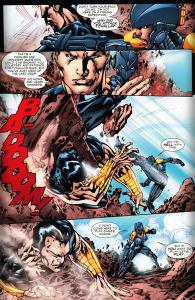 BH: Would you do anything different if you could do it all again?
BH: Would you do anything different if you could do it all again?
MABERRY: That’s hard to say. I feel very good about what I did on the Panther book, so I guess my only regret is that book was canceled. Things were already heading in that direction before I took over, so it wasn’t entirely a surprise…but it left me with a number of Panther stories that I didn’t get a chance to tell.
As far as the content of the books…no, I wouldn’t change anything.
BH: You teamed with Reggie Hudlin briefly while writing Black Panther, any plans for another team up?
MABERRY: I’d love that, but right now it doesn’t seem to be likely. Anything’s possible, though.
BLACK HEROES: Tell us something you have never told anyone else in an interview.
MABERRY: Wow. That’s a tough one. Here’s one, and I’m not ashamed to say it: I enjoy ballet more than my wife. She’s more of a modern dance fan, I still dig stuff like La Corsair and The Firebird. Go figure.
(Laugh) Thanks for your time Jonathan it was a pleasure and good luck to you on all your future endeavors.
_________
JONATHAN MABERRY is a NY Times bestselling author, multiple Bram Stoker Award-winner, and Marvel Comics writer. His novels include GHOST ROAD BLUES, PATIENT ZERO, THE WOLFMAN, and THE DRAGON FACTORY. His nonfiction works include ZOMBIE CSU and WANTED UNDEAD OR ALIVE. His comics include DOOMWAR, CAPTAIN AMERICA: HAIL HYDRA and MARVEL UNIVERSE VS THE PUNISHER. He’s a Contributing Editor for The Big Thrill, and a member of SFWA, MWA and HWA. He is a frequent guest and keynote speaker at genre cons and writers conferences. Visit his website at www.jonathanmaberry.com or find him on Facebook, Twitter, and LinkedIn.

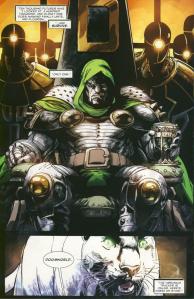

A great interview from a great writer. I look 4ward 2 more from this talent, and so far…what I’vv seen hasn’t disappointed me.
While a vibraniumless Wakanda is a tough pill 4 me 2 swallow, it being so tied 2 T’challah’s & Wakandan history, I believe if there’s any1 that can pull off this new chapter in Pantherlore its Jonathon Maberry!
In fact,the only thing in this interview that I fojnd distressing is that Jonathon eluded 2 the notion that his time w/ the Panther wags going 2 be fairly finite, and my fear is that a “lesser” writer is going 2 drop the ball and return the character back 2 the relative obscurity that it’s suffered off and on 4 better than 40 yrs now.
Finally; 4 all the things that I’m appreciative of that Mr. Maberry has done, now I can add his linking World of Black SuperHeroes thru his twitter page. Now I have another blog that I can subscribe 2. Thank u W.O.B.S 4 an excellent interview. Looking 4ward 2 more.
Phil_byDAY
Oh, God. Please…PLEASE tell me he isn’t coming back to Wakanda or anywhere near it.
I think that these insights are thought provoking.
Thanks for the praise Philly! Fans like you make the hard work worth it! 🙂
Indeed!